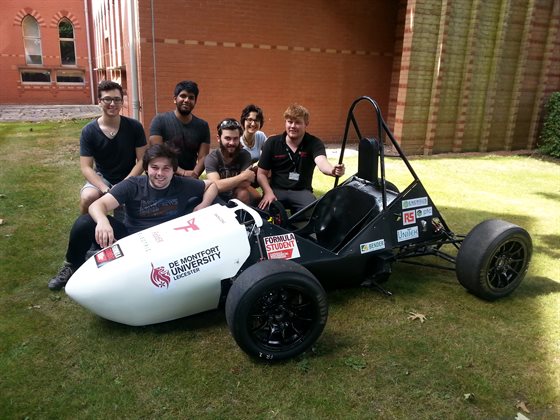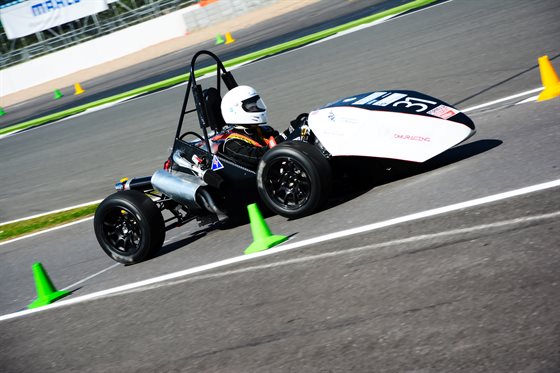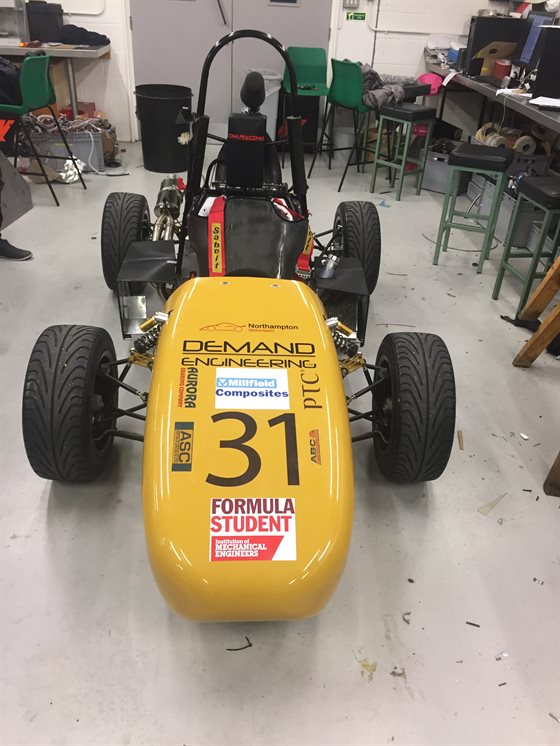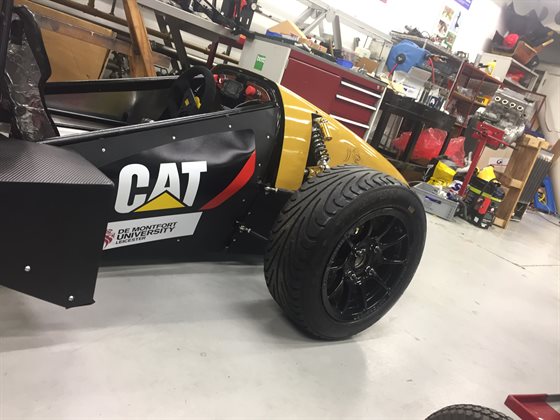It’s a proving ground for the world-class engineers of the future – and De Montfort University Leicester (DMU) has made an electrifying addition to their squad.
After roaring to their best-ever finish in the 2016 Formula Student challenge at Silverstone, DMU has entered two teams to this year’s motorsport design showdown.

The team with the new electric challenger
For the fifth year running, engineering whiz kids have constructed a petrol-powered single-seater for the international competition, with designers hoping this latest model will surge from 0-60mph in a cheek-rippling 3.2 seconds.
And for the first time ever, DMU will also be showing designs for an electric car at the annual university challenge, which starts this week at the home of British motorsport. Just days after Lewis Hamilton scored his fifth British Grand Prix win, DMU students will be following in the triple World Champion's tyre tracks, hoping to emulate his success.
The 10-strong electric car team - a mix of Electrical Engineering, Mechanical Engineering and Mechatronics undergraduates - is being led by Dr Dean Hamilton, a VC2020 lecturer in the Engineering department at DMU, who has worked with Toyota, Jaguar Land Rover and F1 giants McLaren.

Last year's car in action at Silverstone
And his students have shown their green credentials by recycling an old chassis from a vehicle constructed for a previous Formula Student challenge.
Their entry isn’t a finished electric race car – it’s been submitted to a class of the competition which judges blueprints rather than fully functioning four-wheelers - but it is a strong statement of intent by DMU, said Dr Hamilton.
“We will be recycling last year’s Formula Student petrol car for our first electric car. That essentially means that we will be swapping out their motorcycle and petrol tank for a 400 volt battery pack, electric motor (twice as powerful as the motorcycle’s engine) and a motor controller.
“That might sound easy but, in practice, these parts are all computer controlled and we have the difficulty task of getting multiple computers talking to each other in real time to control the speed and torque of the motor from the position of the fly-by-wire accelerator pedal.
“We also have to conform to 175 pages of Formula Student rules which cover car design, high voltage safety and in-vehicle monitoring for example - all designed to challenge students' engineering skills.
“The goal is to make an electric car that runs for next year’s competition and if we can achieve that, that’s a great platform to build on for the following years.
“We haven’t said we’ll finish in the top 10 but we have set the quite ambitious target to develop our first all-electric race car that can reliably complete the multiple racing events like the 22km endurance and slalom events.
“We’ll be hoping to get a very high performance first working car.”

This year's petrol-powered entry
Formula Student teams are vying for trophies and glory, but there are other longer-lasting rewards on offer.
“We’re in the business of educating the next generation of engineers,” he said Dean, “and the next generation of vehicles will be electric, at least to some extent.
“Now is the time to start educating our young engineers to understand this technology, and there’s no better way to understand it than to actually do it.
“Getting involved is great for a student’s CV. If they have an involvement in Formula Student, they can demonstrate they have designed and build a car or some aspect of designing and building a car, surely they are the graduates that are going to get employed first in the motor industry.”
DMU is one of only two universities to send a pair of teams to Formula Student, which has attracted entries from Spain, India, Denmark, Norway, Sweden, Saudi Arabia, Mexico, Ecuador, Poland and Pakistan, among other nations.
The two speed machines have been taking shape in the workshops deep in the heart of the Queens Building on the DMU campus.
Brad Ward, team leader of the petrol-powered DMU Racing team, has been working overtime for months to try and get their car ship-shape.
“I haven’t left the workshop before 8pm since the beginning of March,” he said. “But I’m doing this for the love of it. And of course it’s really good for employability. I’ve learned about leadership, project management and time-keeping.”

Finishing touches being applied to the new petrol-powered machine – named Elsa – include a lick of yellow paint in honour of sponsors Caterpillar.
“About 90% of our car was built in-house,” said Brad. “We aim to build as much as we can, rather than going flat out to win by buying parts.”
Elsa, which is fitted with a Superbike World Championship-winning Honda engine, is certainly nippy. It’s been tested on the rolling road facility owned by another of the sponsors, Northampton Motorsport, where it hit 90mph. The team have also taken it for a spin on the DMU car park, at more sedate speeds.
“It’s scary to drive,” said Brad. “It’s fast, and you’re so low to the ground as you drive it. But it handles really well.
“Last year’s car went from 0-60 in three and a half seconds. We want this one to do it in 3.2 seconds.”
Formula Student, which is run by the Institution of Mechanical Engineers, began in 1981, and made its home in Silverstone in 2007. DMU have been entering the competition for five years, with each petrol car named after a Disney character - Ariel, Belle, Cinderella, Dory and now Elsa.
Dr Hamilton said the launch of an electric car team at DMU signalled the start of an exciting new era for automotive engineering at the university.
“We will be looking to build our team numbers significantly in the next academic year, and including MSc project students. We have a large number of engineering and non-engineering roles and projects available and will begin advertising these shortly.
“In five years’ time, I hope we’ll be working on competitive, reliable technologically advanced full-electric and hybrid petrol-electric race cars, with some components designed and built by the students at DMU.”
The Institution of Mechanical Engineers’ Formula Student competition runs from Thursday, July 20 to Sunday, July 23 at the Silverstone circuit in Northamptonshire.
Posted on Wednesday 19 July 2017